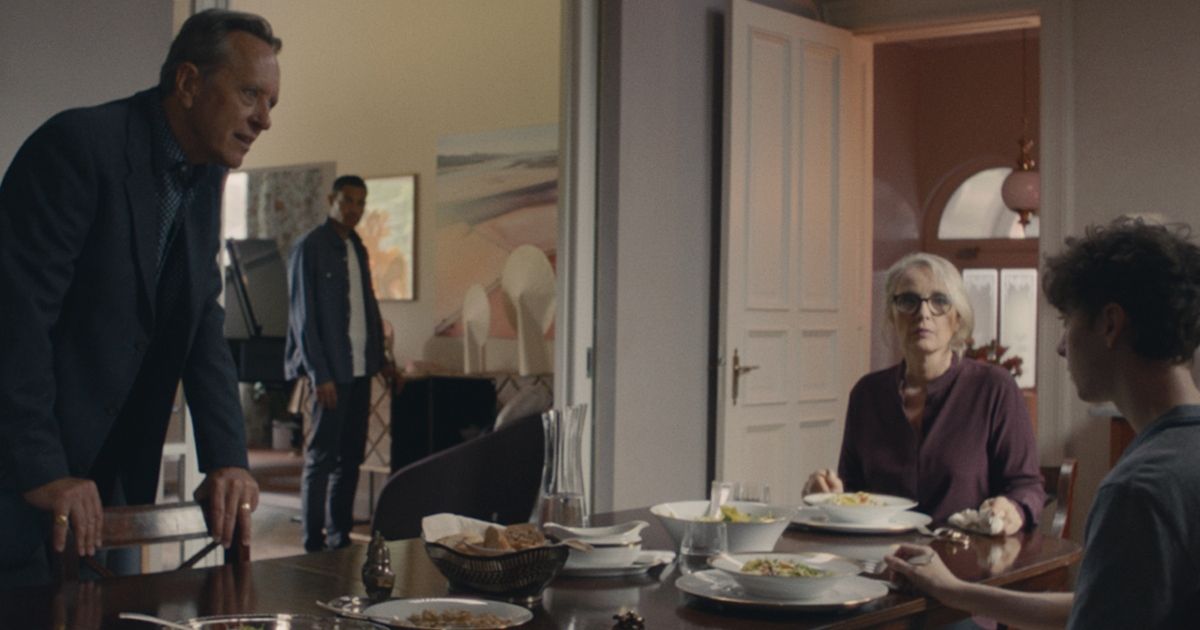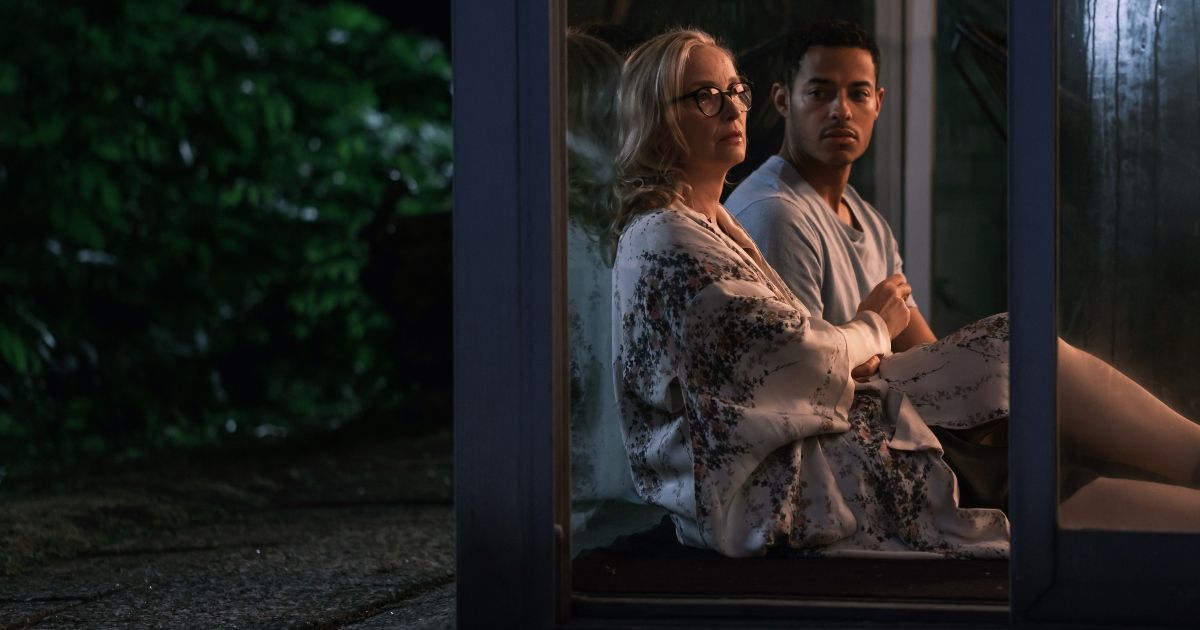Julie Delpy is magic. She always has been, ever since the great but grumpy Jean-Luc Godard first cast her in his film Detective. She has worked with some of the most important directors in the world on masterpieces like White and the Before Sunrise trilogy, and has directed her own witty romantic comedies, 2 Days in Paris and 2 Days in New York. She’s incapable of a bad performance; she’s magnetic even in those anomalistically weak films. Maybe it’s in the eyes, or hidden in the voice.
Her latest movie is The Lesson, in which she stars opposite the legendary Richard E. Grant (Withnail & I, Can You Ever Forgive Me) and young Daryl McCormack (Peaky Blinders, Bad Sisters). Delpy and Grant star as Hélène and J.M. Sinclair, respectively, two artists in a lengthy marriage whose son Bertie (Stephen McMillan) is preparing for difficult entrance exams; the Sinclair’s hire Irish tutor Liam Sommer (McCormack) to help Bertie in his knowledge of literature and creative writing.
The thing is, J.M. Sinclair is a famous writer working on a new book, and Liam is an adoring fan. Hélène is a collector and artist, but her work (and life) seems overshadowed by J.M.’s towering ego and career. J.M. is a domineering patriarch whose judgment is like a weighted blanket on the shoulders of his son; in fact, J.M.’s other son experienced similar pressure and criticism, and responded to it with suicide. It’s clear that Hélène wants a different direction for Bertie, and Liam is caught in the middle of this tense, witty chamber drama. Alice Troughton’s film is an endlessly clever psychological drama with thriller and film noir elements; it’s a study of class differences, family issues, art, originality, and ego, part Wilder’s Double Indemnity, part Polanski’s The Ghost Writer.
Delpy spoke with MovieWeb about The Lesson and her character, the picture’s unique film noir elements, the nature of artists, and the tropes that are deconstructed by the film.
A Mysterious Mother Fatale in The Lesson
The Lesson has a very specific and often enigmatic vibe, and the characters have even more specificity and mystery. It’s difficult to read everyone in the film, at least until the ending, as there are secrets and subterfuge obfuscating the motivations and emotions of different characters as the young tutor co-exists in the same luxurious space as the unhappy husband and wife artists and their glum, bitter son. Hélène is particularly shrouded in mystery. So how did Delpy access the character? What did she draw from?
“I spoke a lot with the writer and with the director of the film about how to approach the character,” explained Delpy. “Alice Troughton didn’t want a typical kind of uptight, contrived, unhappy British wife, she wanted something different. So she kind of wanted above all for her to be a mother, protecting her other son and avenging her feelings for her dead son, who obviously suffered from her husband’s horrible kind of bigger than life, egomaniacal personality.” Delpy continued:
It was mostly out of discussions with the director and the writer that we came to agreeing that she needed to be sort of like a femme fatale, but with a twist. I’m gonna say it again, but it’s like this ‘mother fatale,’ this middle-aged mother fatale kind of thing. I think it’s pretty funny to think of that, like she’s a mother, she’s middle-aged, but she still has this dark, cold side, yet with a loving mother core.
Misogyny and Film Noir
‘Mother fatale’ is a fascinating term to spin old genre tropes, and in many ways, The Lesson playfully picks apart our expectations of a film noir, which have historically seen women conniving behind the scenes to dupe some sucker into making them rich. In different critical circles, the femme fatale trope (and the pessimistic gender roles of film noir in general) can be read as either sexist or liberating. Delpy think it depends on the context, but recognizes The Lesson as something special.
“I think in this specific film, it’s definitely not sexist,” explained Delpy. “She’s doing it for the good cause, and so it’s everything but misogynistic. I think she’s taking revenge, because enough is enough, right? So I think it’s not in this film, for sure. But I don’t know about femme fatale being misogynistic, you know.” She elaborated:
What is misogyny? I mean, it’s complicated. I remember a friend of mine saying misogyny is not men that hate women. It’s men that don’t like women who don’t comply with their idea of what women should be. Because most misogynistic men are actually with women, they just don’t speak a lot to women, they just don’t express themselves. That’s misogyny. So I don’t know about film noir being misogynistic. I don’t know. Not always. Sometimes it is, and sometimes it isn’t.
“It’s not a film noir, but it’s like a thriller type, North by Northwest,” continued Delpy, giving an example of the ethical ambiguity of women in film noir and a positive example (one not too far from Delpy’s Hélène Sinclair in The Lesson). “The character of Eva Marie Saint is indeed manipulative a little bit, but she’s also extremely interesting and sensitive. And in the end, she’s not the bad guy. She’s actually very smart. In that one, particularly, the character is very [positive]. I mean, they’re very sexy and beautiful and all that, but you know, that’s okay.”
Julie Delpy’s Dating Advice for Artists
Another interesting aspect of the film, which exists at the intersection of The Lesson‘s anti-misogyny and its study of art, is the relationship between the married artists. Hélène is obviously skillful and talented; we see her work, and hear her vast knowledge. But her husband J.M. has received the acclaim and financial glory, accolades which seem to suffocate Hélène’s ambitions. We asked Delpy if she thinks artists should marry other artists, or even commit to long relationships with each other.
“I don’t necessarily think artists should date artists. I think artists are better off being with people that understand artists, that could be in the sphere of artists but not necessarily artists themselves. I think it’s complicated, two artists together. Yeah, I think it gets competitive and frustrating,” said Delpy. She continued:
Imagine if Amadeus dated Salierii, you know, that would have not been a good relationship. It’s like, there’s always one artist that’s genuinely better. So then it becomes very difficult, and when it’s a man and a woman dynamic, for many centuries, the woman had to give up. It was a woman that lost, because society was more welcoming to the art of men. There’s a million examples, blah, blah, blah, blah, a million of them
You’ve been warned, artists. Although good luck not falling in love with Delpy’s performance in The Lesson, which will be in theaters on July 7, 2023 from Bleecker Street.
Stay connected with us on social media platform for instant update click here to join our Twitter, & Facebook
We are now on Telegram. Click here to join our channel (@TechiUpdate) and stay updated with the latest Technology headlines.
For all the latest Education News Click Here


